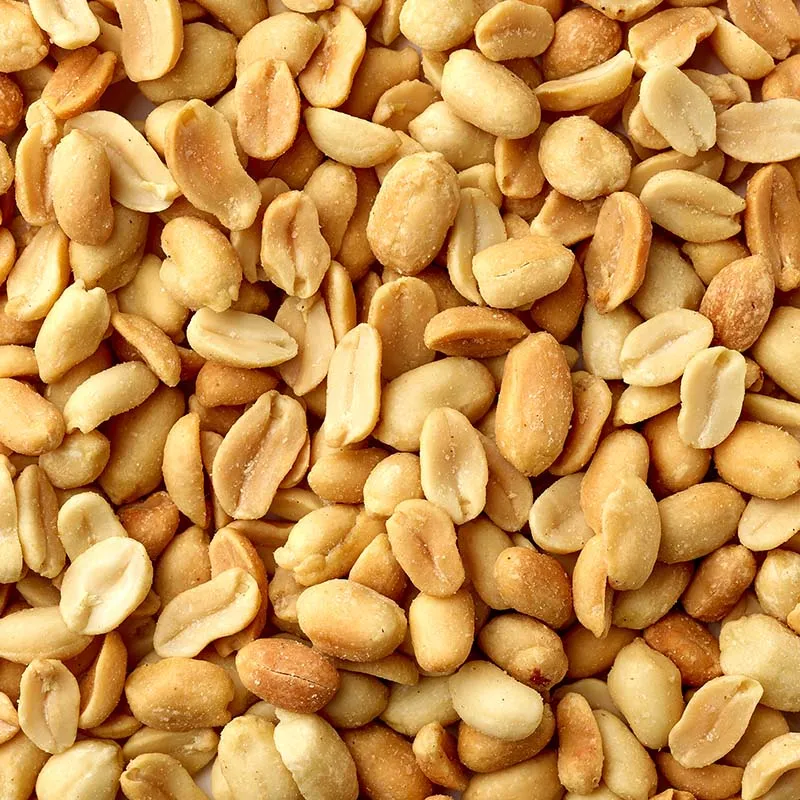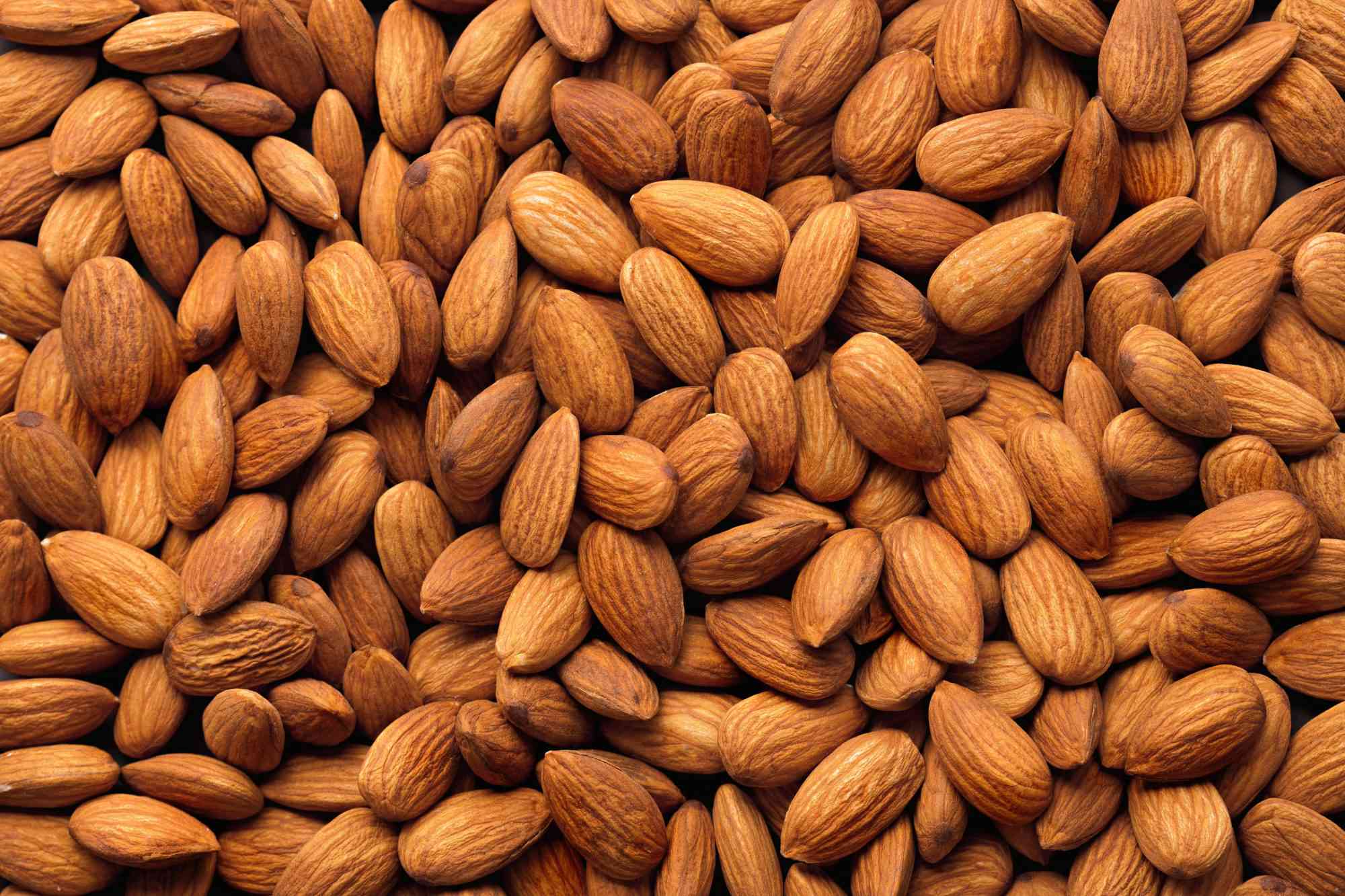There are so many benefits to having a stash of nuts in the pantry. They can be an easy snack and a versatile ingredient in a wide variety of dishes like salads, baked goods, and desserts. Not only that, but nuts are also packed with healthy fats, protein, fiber, antioxidants, and vitamins and minerals.
Peanuts and almonds are two of the most commonly consumed nuts. But how should you choose between them? The best choice will depend on your taste preferences, how you want to use them, and what health outcome you’re looking for.
In this article, we’ll explain the differences between peanuts and almonds, compare their nutritional profiles, and reveal which is the best choice for your health.

What Is the Difference Between Peanuts vs Almonds?
In most cases, peanuts and almonds are both considered nuts, but botanically, they actually fall into two different food groups. Peanuts are technically legumes rather than true nuts and are popular for their affordability and versatility. Peanuts can be found in everything from candy bars and noodle dishes to protein powder and nut butters. They have a rich, earthy taste and a creamy texture when processed into products like peanut butter.
Conversely, almonds are true nuts with a delicate, slightly sweet flavor and crunchy texture. They are often enjoyed raw, roasted, or as almond-based products such as almond milk and almond flour. Almonds are less allergenic than peanuts, making them an option for those with peanut allergies.
Research has shown that the healthy components of peanuts and almonds translate into significant health benefits for those who eat them, namely heart health. In three studies with over 200,000 individuals, consumption of peanuts and tree nuts was associated with a 13%-19% lower risk of total cardiovascular disease and a 15–23% lower risk of coronary heart disease. Both nuts are rich in monounsaturated fats, which are known to improve heart health by reducing LDL cholesterol and increasing HDL cholesterol levels. Peanuts and almonds have also been shown to help with weight loss, likely because of their high fiber and protein content.1, 3, 4
Which One Is Better: Peanuts vs Almonds?
Both nuts offer great health benefits. The best choice for your health depends on your health goals. You might want to go for peanuts if you are focusing on getting more protein in your diet, which can help with weight loss, building muscle, and other aspects of health. On the other hand, if you are concerned with getting enough vitamin E, almonds are a great choice.
Since all nuts boast different nutrient profiles, it could be best to eat a wide variety of nuts to reap all their benefits. Or, you can focus on nuts that will fill a known deficiency. Either way, incorporating more nuts into your healthy diet can be a delicious way to spice up meals and pack in more nutrients!
Whichever one you choose, remember that nuts come with lots of nutrients and a lot of calories. Regarding health, the biggest downside to nuts is that they are very calorically dense, especially pecans, macadamia nuts, and Brazil nuts. Be aware of portion sizes, especially if you are trying to lose weight. Also, nuts are often salted and sugared, so limit how often you eat highly salted, candied, or glazed nuts. Dry-roasted, low-sodium nuts are a healthier option.
Nutrition
Almonds and peanuts have similar nutritional profiles, but some trade-offs with certain nutrients exist.
Peanuts are higher in protein than almonds and are considered complete proteins because they contain good amounts of all 20 amino acids. They also have high levels of a certain protein called coenzyme Q10, which protects the heart under conditions of low oxygen, such as clogged arteries. However, peanuts are also a common allergen, which can limit their consumption for some individuals.
Peanuts are also higher than almonds in most B vitamins, especially niacin and folate. B vitamins are important for many different processes in your body, including digestion, metabolism, nutrient transport, nerve signaling, immunity, and skin health. Have you heard that red wine has some health benefits? The same molecule that gives red wine this hype is also found in peanuts. Resveratrol is an antioxidant that may have benefits for the brain, cardiovascular system, and cancer prevention.
Almonds contain flavonoids, which are another type of antioxidant. Mostly found in the skin of almonds, flavonoids can help prevent oxidation and are associated with reduced risk of several chronic diseases, including cancer, cardiovascular disease, and neurodegenerative disorders.
You can get almost 50 percent of your recommended daily value of vitamin E, another antioxidant, by eating a small handful of almonds. This makes almonds a valuable source since over 90 percent of adults are deficient in this nutrient. Almonds are also higher than peanuts in fiber, magnesium, and polyunsaturated fats, including omega-3 fatty acids, which support heart and brain health and may have anti-inflammatory effects.5
Here are the nutrition facts for peanuts and almonds, given for one ounce (about a small handful) of nuts.
Glycemic Index
The glycemic index measures how much and how fast foods affect blood sugar levels. Nuts have very few carbohydrates and lots of protein and fat, so they lie very low on the glycemic index and can actually counteract spiking blood sugar. On the glycemic scale of 0 to 100, both almonds and peanuts have a score of 15. This means the nuts contain carbs, but very few.


Vitamins
Minerals
Sign up to be the first to know about special offers and exciting Signos news.
References
- Guasch-Ferré, M.; Liu, X.; Malik, V. S.; Sun, Q.; Willett, W. C.; Manson, J. E.; Rexrode, K. M.; Li, Y.; Hu, F. B.; Bhupathiraju, S. N. Nut Consumption and Risk of Cardiovascular Disease. J Am Coll Cardiol 2017, 70 (20), 2519–2532. https://doi.org/10.1016/j.jacc.2017.09.035.
- Kamil, A.; Chen, C.-Y. O. Health Benefits of Almonds beyond Cholesterol Reduction. J. Agric. Food Chem. 2012, 60 (27), 6694–6702. https://doi.org/10.1021/jf2044795.
- Hu, F. B.; Stampfer, M. J. Nut Consumption and Risk of Coronary Heart Disease: A Review of Epidemiologic Evidence. Curr Atheroscler Rep 1999, 1 (3), 204–209. https://doi.org/10.1007/s11883-999-0033-7.
- Mattes, R. D.; Kris-Etherton, P. M.; Foster, G. D. Impact of Peanuts and Tree Nuts on Body Weight and Healthy Weight Loss in Adults. J Nutr 2008, 138 (9), 1741S-1745S. https://doi.org/10.1093/jn/138.9.1741S.
- Papanikolaou, Y.; Brooks, J.; Reider, C.; Fulgoni, V. L. U.S. Adults Are Not Meeting Recommended Levels for Fish and Omega-3 Fatty Acid Intake: Results of an Analysis Using Observational Data from NHANES 2003–2008. Nutr J 2014, 13, 31. https://doi.org/10.1186/1475-2891-13-31.
- Gao, X.; Wilde, P. E.; Lichtenstein, A. H.; Bermudez, O. I.; Tucker, K. L. The Maximal Amount of Dietary Alpha-Tocopherol Intake in U.S. Adults (NHANES 2001-2002). J Nutr 2006, 136 (4), 1021–1026. https://doi.org/10.1093/jn/136.4.1021.
- Guarneiri, L. L.; Cooper, J. A. Intake of Nuts or Nut Products Does Not Lead to Weight Gain, Independent of Dietary Substitution Instructions: A Systematic Review and Meta-Analysis of Randomized Trials. Adv Nutr 2021, 12 (2), 384–401. https://doi.org/10.1093/advances/nmaa113.
- FoodData Central. https://fdc.nal.usda.gov/fdc-app.html#/food-details/172430/nutrients (accessed 2024-07-30).
- FoodData Central. https://fdc.nal.usda.gov/fdc-app.html#/food-details/170567/nutrients (accessed 2024-07-30).
- Durning, M. V.; RN. Health Benefits of B Complex. WebMD. https://www.webmd.com/diet/health-benefits-b-complex (accessed 2024-07-30).
- Everything You Need to Know about Tree Nut Allergy. https://www.aaaai.org/tools-for-the-public/conditions-library/allergies/everything-you-need-to-know-about-tree-nut-allergy (accessed 2024-07-30).
- The Top 9 Nuts to Eat for Better Health. Healthline. https://www.healthline.com/nutrition/9-healthy-nuts (accessed 2024-07-30).
- Arya, S. S.; Salve, A. R.; Chauhan, S. Peanuts as Functional Food: A Review. J Food Sci Technol 2016, 53 (1), 31–41. https://doi.org/10.1007/s13197-015-2007-9.
- How do nuts help your heart health?. Mayo Clinic. https://www.mayoclinic.org/diseases-conditions/heart-disease/in-depth/nuts/art-20046635 (accessed 2024-07-31).
- Chen, C.-Y.; Milbury, P. E.; Lapsley, K.; Blumberg, J. B. Flavonoids from Almond Skins Are Bioavailable and Act Synergistically with Vitamins C and E to Enhance Hamster and Human LDL Resistance to Oxidation. J Nutr 2005, 135 (6), 1366–1373. https://doi.org/10.1093/jn/135.6.1366.




.svg)
.svg)
.svg)
.svg)
.svg)
.svg)
.svg)
.svg)
